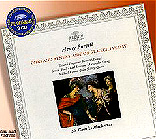This new entrant in DG’s “The Originals Series” repackages new transfers of late-1960s versions of major works by Purcell with mixed results. The gem of the set is Dido and Aeneas, featuring the sublime Tatiana Troyanos as the ill-fated Queen and led by Charles Mackerras with dramatic urgency. Troyanos’ “Ah! Belinda” languishes as it should but never drags, her voice lovely, her low notes carrying alto-like depth and strength. Her touching final scene is excellent, she’s as much a noble Queen as she is a bitterly disappointed lover. Sheila Armstrong is her bright-voiced Belinda, and Mackerras encourages ornamentation that was controversial in 1968 but seems overly discreet these days. The serviceable baritone Aeneas is Barry McDaniel, who sounds more the warrior than the lover, and whose timbre may surprise those accustomed to lyric tenors in the role.
This recording with mainstream forces was one of the first of the opera to incorporate historical performance influences, making it seem less dated than most of its predecessors. It’s still a worthy choice, though it ranks below Janet Baker’s incomparable Dido on Decca and such stellar period-instrument versions as the dramatic René Jacobs on Harmonia Mundi or the exciting Emmanuelle Haim on Virgin.
Unfortunately, the second disc, Purcell’s Ode on St. Cecilia’s Day (aka “Hail Bright Cecilia”), is on a distinctly lesser level of accomplishment. Mackerras again leads a lively performance that captures the grandeur of the work. The orchestra plays well; the trumpets blaze forth with brilliance; the choruses sing with color and strength. But the work is disfigured by the inexplicable decision to cast the soprano part with a boy treble. I’m sure that Master Simon Woolf was a nice child, but it’s beyond my capacities to hear this shallow, hooty, off-pitch squawking as a reasonable substitute for an adult female soprano voice (which Purcell actually used in the premiere–so much for “authenticity”). The same can be said for the two countertenors, who get the lion’s share of solo opportunities and pretty much make a mess of them. These days we’re used to an abundance of countertenors who aren’t as cringe-making as these. The two bass soloists are fine, with the young John Shirley-Quirk’s “Wondrous machine” coming as welcome relief after a string of farcical treble and countertenor solos. Keep the Dido and Aeneas; give the Ode on St. Cecilia’s Day to an enemy.
































